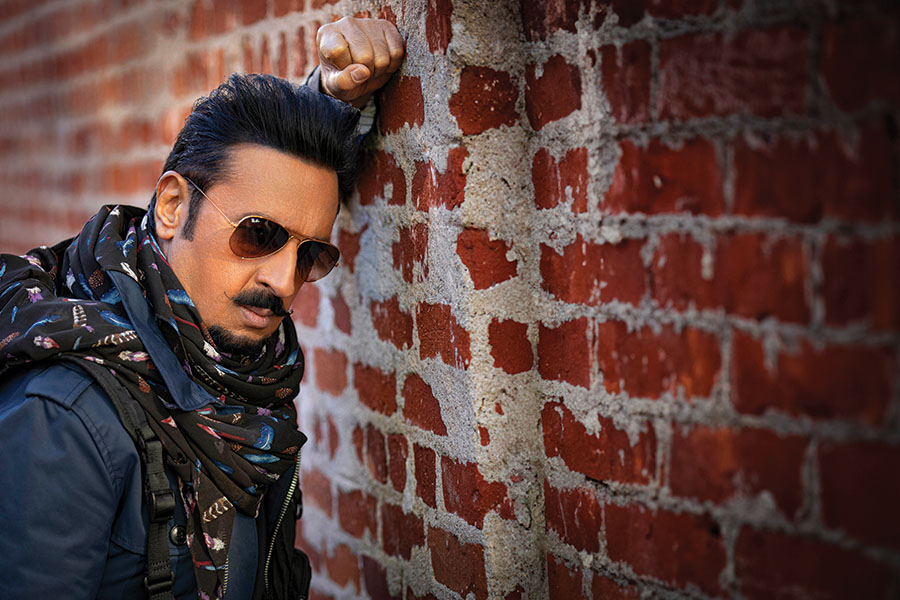
Gulshan Grover: A great bad man behind successful films
Seething eyes, menacing looks, wicked smile, ruthless demeanour, and an ominous-yet-distinct voice... for over four decades, Gulshan Grover played 'evil' roles with panache. With baddies fading fast into the sunset, the 'Bad Man' remains the last classic villainous act of Bollywood
 Gulshan Grover
Image: Ash Gupta. LA
Gulshan Grover
Image: Ash Gupta. LA
Interior. Morning. Pali Hill Bunglow. Mumbai. 1988. Jaggi, the guest, is anxious. He arrives at 7.30, a good 30 minutes ahead of scheduled time. “Can he sense my twitchiness?” the young man wonders. The host of the breakfast meeting, after all, is notorious for spotting flaws in characters, is brutal with his assessment, and has an envious track record in terms of churning incredible blockbusters such as Kalicharan, Vishwanath, Karz, Vidhaata, Hero, Meri Jung and Karma. No wonder, Mahavir is getting jittery. He drags himself towards the edge of the chair, places his elbows on the table, and props up his tapered chin with his sweaty palm. Balma’s roving eyes are hunting for the celebrated Bollywood director, and is quivering with an unknown anticipation of a windfall. “Will I get a role? What will it be?” wondered Chandar Kishan, who is still clueless about the ‘why’ behind the meeting. “It has to be a role in his movie,” Noor continued with his soliloquy.
Meanwhile, destiny scripted a dramatic act for the young boy when he was in Class 9. Grover was getting ready for school, he packed his bag with books, samples of detergents and disinfectants, and a few chapattis wrapped in an old cloth, and started walking towards Punjabi Bagh, an affluent neighbourhood. It was a hard time for the family which was going through a prolonged and rough financial patch. Grover and his brother started doing some part-time gigs to earn some extra bucks and help the patriarch. Grover used to knock on every door, talk to the ladies, and try to convince them to buy household supplies. “It was tough to convince them,” he recalls. The women, though, fell in love with the sincerity and honesty of the good boy. “Or they might have noticed my school uniform and were moved by my plight,” he says. Whatever it be, the good boy had started winning the hearts of his consumers.
 Back in Mumbai, the meeting starts on time. Subhash Ghai plays a magnanimous host, his wife ensures that there is a lavish spread on the table, but the guest is still grappling with the chaotic fluttering of butterflies in his stomach. “Food was the last thing on my mind,” recalls Grover, who landed in Mumbai in 1975 to live his Bollywood dream. The next decade, though, turned out to be nothing less than a nightmare for the commerce grad from Shri Ram College of Commerce (SRCC) who also completed his masters and was set for a career in banking.
Back in Mumbai, the meeting starts on time. Subhash Ghai plays a magnanimous host, his wife ensures that there is a lavish spread on the table, but the guest is still grappling with the chaotic fluttering of butterflies in his stomach. “Food was the last thing on my mind,” recalls Grover, who landed in Mumbai in 1975 to live his Bollywood dream. The next decade, though, turned out to be nothing less than a nightmare for the commerce grad from Shri Ram College of Commerce (SRCC) who also completed his masters and was set for a career in banking. In Mumbai, though, Grover had nothing to bank on. No pedigree, no acting background, and zero connect. He enrolled in the acting school of professor Roshan Taneja, learnt the craft from one of the best in the town, and ran out of luck in getting a break in movies over the next two years. Like most of the aspirants who would come to the tinsel town with starry dreams and realise the harsh reality that it’s not easy to convert reel into real, Grover too was running low on money and hope. He would spend months waiting for his turn to meet some director, producer or the security guard of the movie studios who had direct access to all the big men in the hope of an elusive meeting.
Nothing, though, happened according to the script—his family in Delhi was worried and prayed fervently for his success, and the struggler in Mumbai persisted with his grit. Moved by his sincerity, hard work and talent, Taneja offered a lifeline and a job of an acting teacher at the institute in 1977. Grover got into the act and started teaching.
Meanwhile, life was about to impart a series of lessons in patience to the teacher. Over the next 12 years, Grover played a series of interesting cameos and enacted a battery of characters such as Mahavir in Hum Paanch (1980), Jaggi in Rocky (1981), Balma in Sadma (1983), Chandar Kishan in Avataar (1983), Noor in Sohni Mahiwal (1984) and Dacait Shankar in Pyaar Ke Naam Qurbaan (1988). Unfortunately, all the roles had a fleeting screen presence, and were a mix of good and not-so-good. The characters too were inconsequential and inconspicuous. Grover appeared, and disappeared.
Now at the Pali Hill Bungalow, Grover made a breakfast appearance in front of the ‘Showman’. Both talked about a wide range of movies, but Grover was waiting for a film of a different kind. He was confident that the breakfast would culminate in an exciting offer. “If you get a call from a filmmaker for breakfast, dinner or drinks, then it was a no-brainer. That simply meant a role,” he says. Sadly, Ghai stayed mum, and time started ticking away for Grover who had to rush for his shoot. “Sir, could you please tell me the role?” the actor asked in desperation. Ghai smiled, and broke his enigmatic silence. “Every time you come on screen, you have to say, “I am a Bad Man’,” he smiled again. The guest was perplexed. “That’s it, sir?” he asked in disbelief. Grover, who had always been a good boy in school, college and life, was being offered the role of a bad man. “Yes, that’s it, ‘Bad Man’,” the director nodded, smiled and walked away.

Fast forward to 2023. It has been 34 years since the release of Ram Lakhan, the actor is still famous—remembered, recalled and appreciated—for the negative character of Kesariya Vilayati in Ghai’s blockbuster movie which hit theatres in 1989, and Grover has been proudly wearing the badge of ‘Bad Man’. “The role made me a household name and I began to be known as Bad Man for life. Thank you, Subhash Ghai,” The actor wrote in his autobiography “Bad Man which he penned with Roshmila Bhattacharya.” Over the next few decades, Grover went on to play a wide range of memorable negative characters such as Kali in Shola and Shabnam, Lala Roshanlal in Angaaray, Chappan Tikli in Sir, Thakraal in International Khiladi, and Kabeera in Hera Pheri. The actor breathed life and fire in every negative character he played.
Also read: I want to be remembered for the work I do: Pankaj Tripathi
Over 500 movies since his debut in 1980 in Hum Paanch, and close to three dozen foreign films, Bollywood is yet to find another Bad Man. The reasons are not hard to fathom. First, there can’t be a second Gulshan Grover. The actor, who got to play small lead roles and also romanced in a few songs on screen, always wanted to become a villain. Grover tells us why. He never had the features of a typical and stereotypical hero. “There was nothing strikingly different about my body to make me stand out,” he underlined in his book. “I didn’t have the voice of an Amrish Puri or the charisma of Pran sahab,” he adds. But what he had perhaps not many had: A realisation of his limitations. “Once you brutally confront your limitations, they become your assets,” he reckons.
 What made Grover extraordinary was the ‘extra’ that the ordinary man from Delhi had. Mahesh Bhatt explains. “He [Grover] is like a snake,” the celebrated director pointed out in his foreword which he wrote for Grover’s autobiography. “A snake, because of its ability to shed its old skin and grow a new one, is seen as a symbol of rejuvenation,” he maintained, commenting on the insane enthusiasm of the actor and his talent to deconstruct and reinvent his persona over decades. “No wonder whenever I meet him, the very first thing I say to him is “Gulshan Grover never over,” he concluded.
What made Grover extraordinary was the ‘extra’ that the ordinary man from Delhi had. Mahesh Bhatt explains. “He [Grover] is like a snake,” the celebrated director pointed out in his foreword which he wrote for Grover’s autobiography. “A snake, because of its ability to shed its old skin and grow a new one, is seen as a symbol of rejuvenation,” he maintained, commenting on the insane enthusiasm of the actor and his talent to deconstruct and reinvent his persona over decades. “No wonder whenever I meet him, the very first thing I say to him is “Gulshan Grover never over,” he concluded. Though the acting innings of Grover is far from over, Bollywood is definitely over with villains. Well, there are still baddies, but the characters are dead. There is no Mogambo, no Dr Dang, no Gabbar, no Shakaal, and no Kesariya Vilayati aka Bad Man. Today, there are actors playing negative roles—in fact, villains started losing their sheen when the good and bad got merged and heroes started playing negative roles—but a hero is much larger than life, and the so-called villains are no match to them. “A hero is heroic not because of the fact that he is a hero, but because of a formidable villain,” says Grover, who traces the changing face of villains in Bollywood.

From dacoits, zamindars and money lenders in the villages to politicians, police, ganglords and smugglers in the cities, villains finally got morphed into a metaphor, and the characters got lost. “Poverty could be a villain,” he says, adding that one more trend emerged. “Villains became trophies,” he says. It was like anybody, even for a guest appearance, can play the role of a villain, and it was being treated like a trophy which can be lifted by all. “That’s when villains started to get killed,” he says. A story, Grover underlines, needs a strong negative character.
Bhatt underlines the importance of penning a powerful negative character. “Give your heart to crafting a great villain,” says Bhatt in his foreword, alluding to the advice given to him by legendary writer Salim Khan. “Behind every successful film is a great bad man.”
Grover agrees. “You need bad men to keep cinema alive,” he says, adding that he is confident that Bollywood will revive and resurrect strong negative characters. “The villain will come back with a bang,” the Bad Man signs off with his good note.
(This story appears in the 29 December, 2023 issue of Forbes India. To visit our Archives, click here.)


















